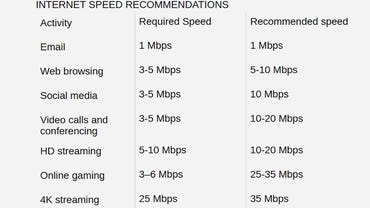What Should Uploading Iternet Speed Should Be?

(Prototype: Shutterstock)
When I first started using the Internet, information technology wasn't that far removed from its Arpanet ancestor. When I was at school, I could connect with it at a blazing fast 10 Megabits per second (Mbps) over Ethernet. From home or on the road I could simply hook upwardly at 300 bits per 2nd (BPS) using both a TI Silent 700 paper terminal with its audio-visual coupler or from a CP/1000 reckoner using a Hayes Smartmodem 300. It was great in its twenty-four hours, only it was never fast enough. Today, I have a cablevision internet connection that, in theory, can get up to ane Gigabit per second (Gbps). It'south still not fast enough.
That'southward because dorsum then all I was working with was text and even that was limited to 25 lines with 80 columns per line. It's a different story now. Today, I practise video conferencing, watch 4K TV shows and movies, and pour gigabytes of information beyond the net. I really can use a Gbps connectedness. But what most yous?
What cyberspace speeds are recommended?

Your local Net service providers (ISP) will happily give you recommendations on their websites, but keep in heed they desire to sell you more bandwidth. ISPs tin also mislead you lot nigh what they can actually deliver. Over the years, I've been told by ISPs they could claw me upwardly with connections they literally physically couldn't deliver. And allow's not even talk about their speed guarantees, which more often than not are wishful thinking.
Then, here's a good list of what you're probably doing on the net and how much bandwidth you lot need to practise the tasks without wanting to tear your pilus out.
That'south fine as far every bit it goes, but it'due south not plenty. For example, fifty-fifty if you simply have one or ii people in your home, there are more than 10 cyberspace-connected devices in the average US home. Besides the ones you start think of -- computers, streaming devices, and gaming consoles -- there are likewise smartwatches, Cyberspace of Things gadgets, and even pet-tracking devices. If you're using these devices all the fourth dimension, and then you'll want to have enough bandwidth to power all of them.
For example, in my computer-happy home role I have over 30 internet-continued devices. If y'all're a regular ZDNet reader, chances are you too have a house filled with cyberspace-continued devices.
How many devices are you using?
For example, right now, my partner is streaming the 4K TV testify Shadow and Bone. I'grand bankroll up my video archives, which run to terabytes of data, to my remote Nextcloud server while checking electronic mail in the background and looking at websites. In a few minutes, I'll be on a work video briefing. And then, altogether, I'm currently using 100Mbps. When my grandsons are over, they go to schoolhouse virtually, beloved to stream Manus Patrol, and dearest their online games, so we can easily crack 200Mbps.
What is your situation?
Now call up about your situation: Are you working from home? Practise you have a large family with several TVs? Are your kids going to schoolhouse online? Chances are you're closing in on 100Mbps at any given time.
Practise upstream speeds matter?
Another factor that didn't employ to matter to most people merely does now is your upstream speeds. Except on cobweb internet connections, most internet technologies offering far lower upstream speeds than down. For case, my Gigabit programme gives me in real life no more than 800Mbps downwardly, just only 40Mbps upwardly. Yes, that all the same sounds fast to most of you, merely if you're doing a lot of online classes or video-conferencing y'all tin run right into those limits and finish up with a bad connexion.
Will y'all get advertised speeds?
Yous must likewise proceed in mind that what ISPs promise they'll deliver in the mode of bandwidth often isn't what you get. For example, the Federal Trade Committee, along with law enforcement agencies from six states, recently sued Borderland Communications, alleging that the company didn't provide many consumers with the internet speeds information technology promised them. And, adding insult to injury, the company charged many of them for more expensive and higher-speed service than was actually provided.
In my experience, this is all also common. According to AllConnect, a company that helps users find the best telecommunication deals, "15% of net users, or 45 million people, are getting less than their advertised speeds." Of those, "Fiber and cable net take the biggest gap – with most people getting, on average, about 55% of the speeds they pay for."
Now if y'all could just shop for an Isp that wouldn't be so annoying. Yous'd just become with the ISP that actually delivers the broadband goods. Unfortunately, as the non-profit Institute for Local Cocky Reliance points out, "83.3 million Americans tin can but access broadband through a unmarried provider."
Are you lot a heavy net user?
Fifty-fifty if yous are paying for loftier bandwidth, yous may not always go it. ISPs often throttle your service if you lot're a "heavy" internet user or during "times of high traffic." To meet if this is happening to you, run a speed examination, and note the results. Then download and turn on a good virtual private network (VPN). Usually, your numbers will be less when y'all're running a VPN. Security comes at a functioning cost. But, if you get better speed with a VPN, odds are you lot're being throttled.
Finally, if you really aren't getting plenty bandwidth with your current plan and y'all accept no other options, I hate to say it, only you can ever pay for a higher-level program to become the speed y'all actually demand.
What are the different types of ISPs available?
If you lot do have a choice of ISPs and cyberspace delivery technologies, I recommend, in this social club, the following connection types: Fiber, the fastest of the fast; cable, can be skillful on downstream speeds, but tends to be much slower on upstream; and LEO satellite and 5G net are both good, but they're still in their teething stages and their operation tin be erratic.
Then, there are the connections I can't recommend, but if you have no other choice in the affair, well and then you have no other pick. DSL, when y'all tin still get it, is decent with real-globe speeds in the double-digit Mbps down and single-digit Mbps up. Merely AT&T is getting out of the DSL business organization so yous tin can no longer get it. If your DSL connection goes out, I've had AT&T customers tell me Ma Bell won't fix it.
Traditional satellite internet companies, HughesNet and Viasat are better than nothing if you live out in the country. But their download speeds max out, in my experience, at 30Mbps. Upload speeds are stuck effectually 3Mbps. The real killer though is the latency. With 300 to 500 milliseconds between pressing a key and seeing a result, video gaming and conferencing are next to impossible to pull off. Both services have data caps that volition slow your downwardly speeds to well-nigh 3Mbps if you use too much data.
Finally, if you lot've got null else, believe information technology or not, dial-upwardly modem ISP services still exist. These are cheap merely at a height speed of 56 Kilobits per second (Kbps) no one will want to use these today unless they literally accept no other choice.
Ready to look for another, improve Internet access provider or at to the lowest degree a better connection? I wish you lot luck. Me? I'yard trying to find my way to a 10Gbps domicile-function connectedness.
Source: https://www.zdnet.com/home-and-office/networking/how-much-internet-speed-do-you-really-need/
0 Response to "What Should Uploading Iternet Speed Should Be?"
Post a Comment